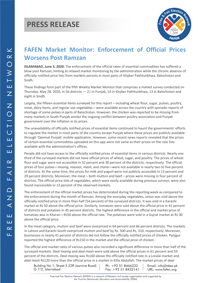ISLAMABAD, June 3, 2020: The enforcement of the official rates of essential commodities has suffered a blow post Ramzan, hinting at relaxed market monitoring by the administration while the chronic absence of officially notified price lists from markets persists in most parts of Khyber Pakhtunkhwa, Balochistan and Sindh.
These findings form part of the fifth Weekly Market Monitor that comprises a market survey conducted on Thursday, May 28, 2020, in 56 districts — 21 in Punjab, 14 in Khyber Pakhtunkhwa, 13 in Balochistan and eight in Sindh.
Largely, the fifteen essential items surveyed for this report – including wheat flour, sugar, pulses, poultry, meat, dairy items, and regular use vegetables – were available across the country with sporadic reports of shortage of some pulses in parts of Balochistan. However, the chicken was reported to be missing from many markets in South Punjab amidst the ongoing conflict between poultry association and Punjab government over the inflation in its prices.
The unavailability of officially notified prices of essential items continued to haunt the governments’ efforts to regulate the market in most parts of the country except Punjab where these prices are publicly available through ‘Qeemat Punjab’ mobile application. However, some recent news reports revealed that the prices of certain essential commodities uploaded on this app were not same as their prices on the rate lists available with the administration’s offices.
People did not have access to the officially notified prices of essential items in various districts. Nearly one third of the surveyed markets did not have official prices of wheat, sugar, and poultry. The prices of wheat flour and sugar were not accessible in 32 percent and 30 percent of the districts, respectively. The official prices of four pulses—moong, masoor, mash, and chana—were not available in nearly two to five percent of districts. At the same time, the prices for milk and yogurt were not publicly accessible in 13 percent and 29 percent districts. Moreover, the meat – both mutton and beef – prices were missing in four percent of districts. The official price lists of vegetables, which were easily available during previous surveys, were also found inaccessible in 13 percent of the observed markets.
The enforcement of the official market prices has deteriorated during the reporting week as compared to the enforcement during the month of Ramzan. Among the everyday vegetables, onion was sold above the officially notified price in more than half (54 percent) of the surveyed districts. It was sold in a Karachi market at Rs 50 above the official price. Similarly, tomatoes were sold above the official price in 41 percent of districts and potatoes in 45 percent districts. The highest difference in the official and market price of tomatoes was in Kharan—Rs50 above the official rate. The potatoes were sold in a Gujrat market at Rs 30 above the official price.
In the meat category, mutton and beef were overpriced in 64 percent and 66 percent districts. The markets in Lahore and Karachi South overpriced mutton and beef by Rs. 500 and Rs. 310, respectively. Moreover, businesses in nearly 41 percent of districts did not follow the officially notified prices of chicken. Panjgur reported the highest difference of Rs150 in the market and the official price of chicken.
The official and market rates of various pulses also recorded a significant difference in more than half of the surveyed markets. Daal moong and daal mash were sold above the official prices in 61 percent and 59 percent of the districts. Daal moong was Rs160 above the officially notified rate in a Loralai market and daal mash Rs120 more than the official price in a market in Killa Abdullah. The market prices of daal masoor and gram varied from the official prices in around 54 percent and 52 percent of the districts. Daal masoor was sold at Rs84 above the officially notified rate in a Karachi market with gram Rs80 above the official price in a market of Killa Abdullah.
Refined sugar and wheat flour were sold above the official rates in 46 percent and 41 percent districts. A 20-kilogram wheat flour bag was sold Rs200 above the official price in Sukkur, and refined sugar Rs18 more than the market price in Karachi East.
The market rates of eggs per dozen were above the officially notified prices in 34 percent districts. At the same time, the milk and yogurt prices were higher than the official rates in 45 percent and 34 percent of the observed districts.
TDEA-FAFEN generates the weekly market monitor covering 15 essential kitchen items, including groceries such as wheat, pulses, oil, sugar, and perishable commodities like meat, and vegetables. It does this considering the need for an independent and regular assessment of the availability of such items.
The observers obtained the official prices from the officials of district administrations, or market committees, and collected the wholesale prices through market surveys. In the case of Punjab, the government price app ‘Qeemat Punjab’ was also used to fetch the official rates.


